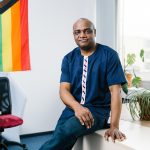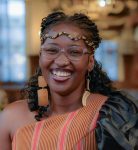Isadora Cardoso is a queer feminist climate activist and researcher from Brazil, who has been working on gender and climate justice for many years. After being with the Research Institute for Sustainability in Potsdam, Isadora is currently working as a PhD Fellow at the Freie Universität Berlin. The conversation with denkhausbremen revolves around false narratives around gender and climate issues as well as intersectional perspectives on climate justice (Foto: Ana Rodríguez).
denkhausbremen: What comes to your mind when you think of climate justice?
Isadora Cardoso: The first thing I can think of, is that climate justice is about a good life for everyone, especially for people that are most affected by injustices in general. Where even the most marginalized people in our societies from all corners of the world can live in dignity and have access to a good environment, housing and so on. These are basic rights, every human deserves them. The climate crisis aggravates the structural injustices that already exist today. This is why for me climate justice involves every fight for justice.
As a researcher, you are working on gender issues and the climate crisis. What is the connection between these topics?
First of all, the reduction of gender issues to women and girls is still very widespread in research on the topic. From this narrowed perspective of gender, there is evidence that – in many social contexts – women and girls are facing more difficulties to adapt to the impacts of climate change and to be represented in decision-making around climate issues.
Can you give an example?
One very common example, which is reused a lot to justify the connection of gender and climate, is that of severe droughts. In many communities, women and girls are expected to do most of the unpaid domestic work. That’s why they are also responsible for supplying their families with food and water. Due to more frequent drought events in the future, women and girls will have increasing problems to find enough water, grow vegetables and provide care for their families. They might have to walk longer distances to get food and water, which consequently leads to more unpaid work, but also to a higher exposure to violence, depending on where they have to go.
In my opinion, this common narrative about gender and climate generalizes too much. It spreads the message that women and girls are more affected by climate change everywhere. In my opinion, the underlying studies are not sensitive enough to the specific social contexts and different power dynamics within them. Most of this evidence is just reproducing the same pictures: Women and girls are turned into victims.
So, the focus should be more on the power relations in general?
Yes. Within my research, I have been working with an intersectional framework since some time. I try to be sensitive to the context and to understand the power dynamics in and between communities. Gender is always an issue I have a look at, but I see it in relation to other aspects in our society, such as race, age, class, disability or territory. All of them are interconnected and should be analyzed in relation to one another, so that power imbalances, oppressions and hierarchies are turned visible. With this, the work of fighting injustices becomes clearer. I find this really important to have in mind, so that you are not simply jumping to „women and girls are dying more due to the climate crisis“.
Apart from that, it is also important to mention that the gender narrative is still very binary. It often approaches inequalities of women in relation to men – non-normative genders and sexualities are usually not considered in many studies.
How does the climate crisis affect queer people?
For example, when losing your house or your documents due to flooding-events, this is tough for everyone, of course. But for queer people, the chances of being exposed to additional social discrimination and violence when trying to recover their documents or finding a secure space to live after such a disaster, are higher. We are stigmatized everywhere, even here in Germany, where society calls itself progressive. Queers, especially trans people, face extra barriers in accessing basic needs, from dignified healthcare access to decent jobs. In situations where we need extra support and care, I think any queer person can understand the difficulties of not easily finding safe spaces. One is turned very vulnerable.
When already quite in disadvantage in non-critical conditions, the brunt of having to cope in the face of climate impacts becomes much heavier on us, even more when we are also marginalized based on our race, migratory status, age or disability. Again, instead of falling for binary and simple explanations of how climate change affects different society groups, for me it is important to understand people and communities intersectionally, and in relation to their contexts.
So, climate justice is also about giving spaces to everyone… You attended the UN Climate Change Conference (COP28) in Dubai at the end of last year. How did you perceive it?
Well, these negotiations are inaccessible spaces in many ways, especially for the most affected and marginalized people from the Global South. Not only because there is security as well as language and physical barriers that prevent you from really being part and influencing in the way you think it’s necessary. But also, because there are certain agendas and settings you have to adapt to, not the other way around. You must speak English to articulate yourself and to follow the debates about climate policies that decide about your future.
The people who suffer the most from structural injustices are not the ones deciding. Due to this inaccessibility, I find these international climate negotiations very contradictory and hypocritical.
From a gender perspective, the negotiations are still very male-dominated.
Yes, that’s true. To promote a gender balance in international climate policies, the UNFCCC (UN Framework Convention on Climate Change) publishes a gender report every year. Interestingly, they still count binary – men and women participants basically. In 2022, at the COP27 in Sharm el-Sheikh – for which the latest data are available – only 37 % of the party delegates were women. Mostly white men decide about everyone’s future.
How can we contribute to solve the international struggles for climate justice from the local level?
It is important to have the big picture in mind. Understanding that when we talk about climate justice, we are also talking about the very injustices of our everyday lives, like classism, racism, transphobia, colonialism or neo-extractivism, especially in the Global South. Keeping in mind the historical responsibilities and conditions that give so much more power and privileges to the citizens, private companies and governments of the Global North.
From this understanding, we can support grassroots organizations or movements in the Global South in implementing their projects in their context, for example through research or money transfer. Unfortunately, most of the international cooperation projects are very problematic as they are based on a Western European logic, only a few are grounded on real equality and solidarity with the groups they work with. In my opinion, it is crucial to give autonomy and sovereignty to people and initiatives in territories most affected by climate injustices – because they know what’s best for them and their context, and not the privileged.







